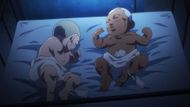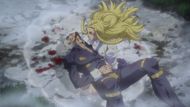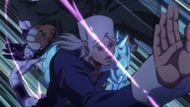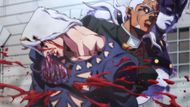Since JoJo’s Bizarre Adventure first began in 1987, the series has repeatedly explored one of the oldest and most enduring themes in literature, duality. Across each part of the saga, many rivalries exist, but one stands apart for its complexity, emotional weight, and symbolic richness: the relationship between Weather Report (born Domenico Pucci) and Enrico Pucci, the central antagonist of Stone Ocean.
Domenico and Enrico Pucci were born as fraternal twins on June 5, 1972. In those first moments, they were, in every sense, equals, two halves of the same whole. But fate, in the cruel fashion often seen in JoJo, intervened almost immediately.

A grieving mother, whose newborn had just died, secretly swapped her lifeless child for baby Domenico, effectively abducting him. Raised under the name Wes Bluemarine, the boy who would become Weather Report grew up unaware of his true parentage, while Enrico remained with his biological family.
This early divergence established the foundation for their contrasting lives. Weather’s upbringing was modest but grounded in simple virtues. By sixteen, he was a high school student balancing part-time work with friendships, living a life defined by human connection. His moral compass pointed toward justice, and he possessed a natural openness to love and compassion.
Pucci’s world, by contrast, was one of privilege, religious devotion, and strict order. Raised in a wealthy Roman Catholic household, his ambitions led him toward the priesthood by the age of fifteen. But his faith and his moral framework would be forever altered when he encountered the charismatic and malevolent Dio Brando.
The tragedy of Perla in JoJo’s Bizarre Adventure: Stone Ocean

While Pucci’s worldview was being reshaped by Dio, Weather was falling in love with a young woman named Perla Pucci, unaware that she was his biological sister. Perla, equally unaware of their familial connection, reciprocated his feelings.
Only Pucci in JoJo’s Bizarre Adventure knew the truth, having learned of Weather’s survival from an anonymous confession made by Weather’s adoptive mother. He feared revealing their sibling relationship would devastate Perla. Instead, he sought to separate them by indirect means, hiring a local gang to intimidate Weather into ending the romance.
But this decision unleashed a catastrophic chain of events. The gang’s actions escalated into violence, leading to Weather being beaten and hung from a tree. Perla, finding him apparently dead, was driven to despair and took her own life by leaping from a cliff.
Fate, hypocrisy, and the inevitability of confrontation

The tragedy of Weather and Pucci’s relationship in Jojo's Bizarre Adventure is that it was never merely a conflict of opposing ideologies. Their fates were intertwined from the moment of their birth.
Pucci’s attempt to “protect” Perla set in motion the events that would destroy her, break Weather’s spirit, and ultimately create the very enemy who would stand against him at the climax of JoJo’s Bizarre Adventure: Stone Ocean.
Speculation: What Araki meant with their duality in Jojo's Bizarre Adventure

Why did Araki choose to craft such a layered and tragic opposition between these brothers? One interpretation is that Weather and Pucci in JoJo’s Bizarre Adventure represent two possible paths of faith in the face of tragedy.
- Weather loses faith in humanity and God alike, allowing grief to consume him until only revenge remains. His angelic powers become destructive because they are divorced from compassion.
- Pucci clings to faith but misplaces it entirely, idolizing a false god (Dio) and bending morality to fit a distorted vision of “heaven.”
In both cases, tragedy warps the moral compass, but in opposite directions. Weather rejects belief altogether, while Pucci in JoJo’s Bizarre Adventure embraces belief to the point of fanaticism. The result is a perfect thematic mirror, where neither brother truly occupies the space of “hero” or “villain” in absolute terms, yet both fulfill those roles relative to each other.
Final thoughts
In the end, it is Weather, horned and devil-like in appearance, whose Stand reflects divine justice, and Pucci, draped in holy vestments, whose Stand embodies the serpent’s deceit.
Their final clash, JoJo’s Bizarre Adventure, is not just the resolution of a personal vendetta but a thematic statement: that evil wearing the mask of righteousness is the most dangerous of all, and that sometimes, the truest act of salvation comes in the form of destruction.
Through Weather and Pucci, Stone Ocean delivers one of JoJo’s Bizarre Adventure’s most nuanced and tragic portrayals of duality, a story where heaven and hell are not places but states of the human heart.
